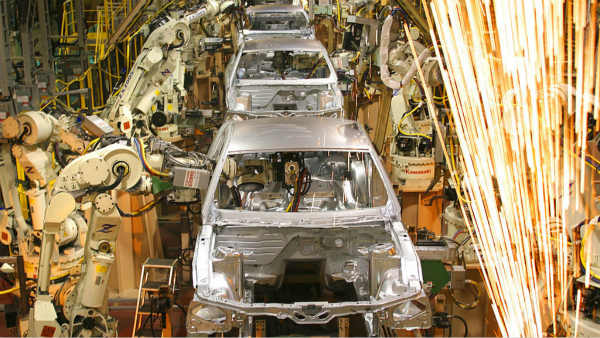(单词翻译:单击)
At a in dinner in Silicon Valley in 2011, President Barack Obama is reported to have asked Steve Jobs what it would take for Apple to employ Americans in America to make iPhones. With characteristic candour, Mr Jobs replied: “Those jobs aren’t coming back.”
据报道,2011年在硅谷的一场晚宴上,时任美国总统巴拉克?奥巴马(Barack Obama)问史蒂夫?乔布斯(Steve Jobs),苹果(Apple)怎样才会在美国雇用美国人生产iPhone。乔布斯以自己特有的直率回答道:“那些工作不会回来了。”
In that one comment he was making three points that President Donald Trump might consider as he wends his curious way between deregulation and protectionism, between slashing taxes to liberate business and a heavy-handed industrial policy.
这句话中所表达出的三层意思,现任美国总统唐纳德?特朗普(President Donald)或许应当考虑。目前,特朗普正在“去监管”与保护主义之间、在减税以解除企业包袱与高压的产业政策之间走一条不同寻常的道路。
The first point was that politicians had to stop kidding themselves about bringing manufacturing jobs back to America. Some may return, but never on the scale of the post-second world war years. Brains and busywork have replaced brawn. The vision of the American worker has gone from the great, sinewy He-Men of Thomas Hart Benton’s murals, heaving rocks and pounding metal, to Google programmers and the office-park slackers of Workaholics.
第一点是,政治家们别再欺骗自己,说什么可以让制造业就业岗位回到美国。部分就业岗位可能回到美国,但绝不会有二战后那样的规模。脑力和琐碎工作取代了体力劳动。美国工人的形象已经从托马斯?哈特?本顿(Thomas Hart Benton)壁画中身形伟岸、肌肉发达、举石锤铁的硬汉,变为谷歌(Google)的程序员和情景喜剧《工作狂》(Workaholics)中那些上班像逛公园一样闲散的员工。
Mr Jobs’ second point was that outsourcing was no longer just a hunt for the lowest possible cost. The best plants in Shenzhen had shot up the learning curve, to become the best of their kind at any price. Even if Apple were to build a plant in America and pay American workers American wages, it would take a long time to manufacture with the speed, precision and flexibility the company could achieve with its partners in China. And that is to assume the Chinese stopped getting better.
乔布斯话中的第二点意思是,外包不再只是尽可能寻找最低成本。深圳最好的工厂快速拉升了学习曲线,不惜一切代价要成为同行中的翘楚。即便苹果在美国建厂、向美国工人发美国水平的工资,也需要很长时间才能达到其在中国与合作伙伴所能达到的制造速度、精度和灵活性。这还是在假定中国合作伙伴不再提升水平的情况下。
And the third was that the best US companies had become brilliant at managing across borders and directing resources to where they generate the highest returns. They weren’t victims of globalisation. They were its masters and had become less and less American.
第三点是,最优秀的美国企业已非常擅长跨国界管理以及将资源配置至可产生最高收益的地区。他们不是全球化的受害者。他们是全球化的主宰者,而且变得越来越“去美国化”。
In 1990, the economist Robert Reich published an article titled “Who Is Us?” He argued that the success of US-owned corporations and American competitiveness were the same thing. Business was off plundering new markets and employing tens of thousands of foreign workers. Meanwhile, foreign companies, notably the Japanese, were investing in American plants and factories, hiring American workers, and teaching their American rivals how to be more productive. Foreigners were driving American competitiveness, while Americans were off seeking higher returns on capital overseas. So to his question “who is us?” Mr Reich answered: “The American workforce, the American people, but not particularly the American corporation.” And this was several years before the North American Free Trade Agreement.
1990年,罗伯特?赖克(Robert Reich)发表了一篇题为《我们是谁?》(Who Is Us?)的文章。他认为,美国企业的成功与美国的竞争力是一回事。美国企业不再抢夺新市场,不再雇用数以万计的外籍工人。与此同时,外国公司(尤其是日本公司)在美国投资建厂、雇用美国工人,教美国竞争对手如何提高生产效率。外国人推动了美国竞争力的提升,而美国人不再在海外寻求更高的资本收益。因此,对于他的“我们是谁?”这个问题,赖克回答道:“我们是美国劳动力、美国人,但不见得是美国企业。”那时距《北美自由贸易协定》(North American Free Trade Agreement)签订还有好几年。
These decades of multinational shape-shifting have made America’s largest corporations easy prey for an economic nationalist. Ford, for example, has 199,000 employees worldwide, of whom only 48 per cent are in America. Apple has about 66,000 employees in the US yet is reported to have had almost five times that number working on making a single version of the iPhone at its Chinese supplier, Hon Hai.
这几十年来,美国大企业朝着跨国公司的形式转变,使它们很容易成为经济民族主义者的攻击目标。例如,福特(Ford)在全球拥有19.9万名员工,其中只有48%是在美国。苹果在美国拥有约6.6万名员工,但据称在苹果的中国供应商鸿海(Hon Hai),生产一款iPhone的工人就几乎是这一数字的五倍。
If one accepts Milton Friedman’s argument that a corporation’s sole responsibility is to its owners, then one cannot find fault with these multinationals. They plant their flag where the money is. Their shareholders don’t want them playing the “Star Spangled Banner” in the boardroom. And while they may not directly be investing in American workers, they are generating returns for US investors who can reallocate their capital as they see fit. Mr Trump has done precisely this with his own business, investing in property deals far beyond US shores.
如果你接受米尔顿?弗里德曼(Milton Friedman)的观点,即一家公司唯独需要向其所有者负责,那你就挑不出这些跨国公司有什么错。哪儿能赚钱他们就上哪儿。股东们不希望他们在董事会会议室奏响美国国歌。虽然他们或许没有直接在美国工人身上投资,但他们在为美国投资者带来回报,而后者可以将资本再配置到自己认为合适的地方。特朗普在自己名下的企业中就是这样做的,在远离美国的地方从事房地产交易。
But this is a fragile argument and Mr Trump is gleefully smashing it to pieces. He knows you cannot respond to stagnant wages and economic insecurity among the working and middle classes with the crystalline logic of a Nobel-winning economist. And he is threatening to perp walk before the press any companies that disappoint him.
但这一论点不太有力,特朗普正得意地将它撕成碎片。他知道,你无法用一名诺贝尔经济学奖得主的清晰逻辑来应对中产工薪阶层工资增长停滞及经济上缺乏保障的问题。他威胁要让任何令他失望的企业在媒体上曝光。
The other problem for US multinationals is the 2004 Homeland Investment Act, which gave companies a tax break if they repatriated foreign income. The government told them they were being given this on the condition they invested in R&D and worker training. They were not to hand it all out to shareholders through dividends and buybacks. Guess what happened next?
美国跨国公司面临的另一个问题是2004年的《本土投资法案》(Homeland Investment Act),该法案规定企业将海外收入汇回国内可享受税收减免。美国政府告诉他们,只要他们投资研发和员工培训,就可以享受减免。他们没有通过派息和股票回购将海外利润全部分给股东。猜猜接下来发生了什么?

The problem was the “fungibility of money”. Once companies brought their foreign money home and ran it through the accounts, it became a shell game. The government couldn’t keep track of which money was what, and where overseas funds were going. Shareholders got somewhere between 62 and 90 cents of every dollar repatriated.
问题在于“金钱的可替代性”。企业将海外资金汇回国内并通过国内账目来管理之后,这就和变戏法一样了。政府无法跟踪哪些资金属于什么性质,海外资金去了哪里。股东可以从汇回的每一美元中得到约62至90美分。
Today, US companies are holding an estimated $1tn or so in cash overseas. If they were given another opportunity to bring it home, chances are the same thing would happen again.
如今,美国企业在海外拥有约1万亿美元现金。如果他们再有机会将这些现金汇回国内,很可能还会发生同样的事情。
For global companies, patriotism can be stimulated with incentives like tax breaks, or threats like tariffs, but it is not a natural state of mind. Capital hasn’t been scarce these past few years. If businesses saw more value in investing in American workers, they could easily have done so. But they would rather wait for robots.
对跨国公司而言,爱国主义可以通过像减免税这样的激励政策或者征收关税之类的威胁激发出来,但这并非一种自然心态。近几年资本并不稀缺。如果企业认为在美国工人身上投资更有价值,它们很可能已经这样做了。但它们宁可等待机器人。
The writer is author of ‘What They Teach You at Harvard Business School’
本文作者著有《在哈佛商学院他们教你什么》(What They Teach You at Harvard Business School)一书


